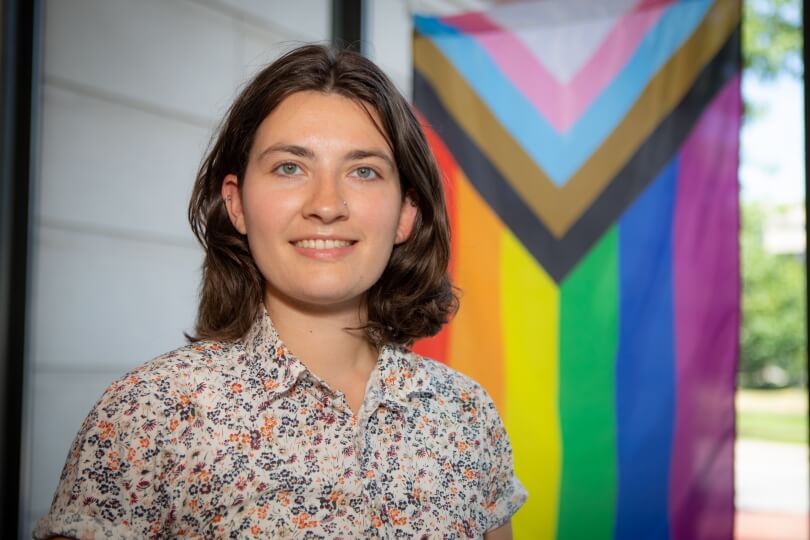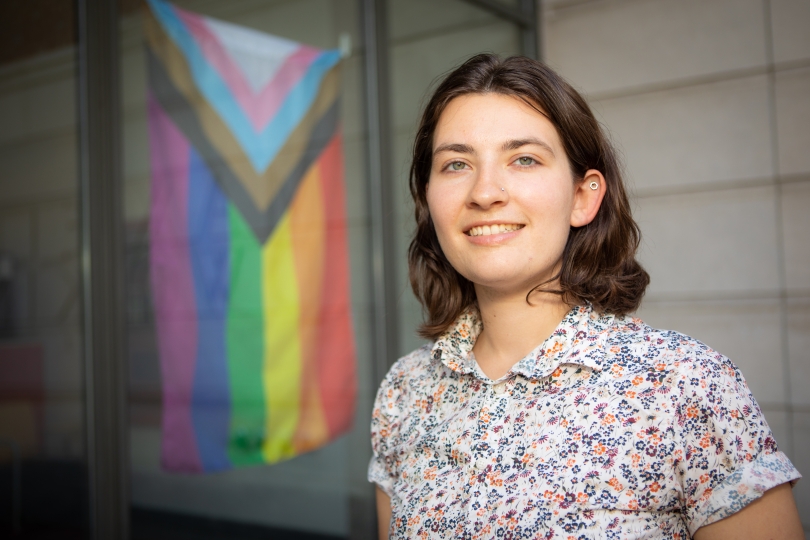Ashley Cavanagh knew she’d found the right graduate program when she joined the Harvard John A. Paulson School of Engineering and Applied Sciences (SEAS). The work being done in the lab of Robert Westervelt, Mallinckrodt Professor of Applied Physics and of Physics, matched perfectly with her undergraduate thesis work at Mount Holyoke College in western Massachusetts. She joined the Westervelt Group in 2019 to pursue a Ph.D. in applied physics, exploring the fundamentals of matter through her research in microscopy.
Ashley Cavanagh is a Ph.D. candidate in applied physics at SEAS, and president of LGBTQ@GSAS, the LGBTQ+ support and advocacy group for students in the Harvard Graduate School of Arts and Sciences. (Eliza Grinnell/SEAS)
“We’re really trying to get a sense of what is happening at the building blocks of these new materials that are being synthesized so that we can take advantage of them and build exciting electronic devices like quantum computers,” she said. “The research was exactly what I wanted to continue doing and build on this existing base of knowledge that I had.”
Cavangh’s research uses two techniques called electron microscopy and scanning probe microscopy. In electron microscopy, streams of electrons are used to examine structures that are smaller than the wavelength of visible light.
“Because these electrons are so small, we can see these really tiny things and actually get atomic-scale images,” she said.
Scanning probe microscopy runs a probe over the surface of a structure. By putting an electric charge at the tip of the probe, it can also scan the flow of electrons in the specimen by seeing how they react to the charge. Data like that is essential to developing new electronics or quantum materials.
“I really like pushing what we can do and understand, but I think it would be hard for me to enjoy that if I didn’t know that there were applications,” she said. “I like knowing that what I’m doing is contributing to technological advancement, but I enjoy being able to pass it off to somebody else to actually build the applications while I dig into the fundamental science.”
Harvard and Mount Holyoke offered similar educational opportunities, but Cavanagh found the social scenes to be much different. Mount Holyoke’s history as a women’s liberal arts college made it easy for her to naturally build a community of lesbian, gay, bisexual, transgender and queer (LGBTQ+) friends, without the need to join a formal LGBTQ+ student organization.
She took a different approach at Harvard, where she joined the Harvard LGBTQ@GSAS Association, the support and advocacy group for students in the Graduate School of Arts and Sciences (GSAS).
“I first discovered the group at the activity fair at Orientation,” she said. “It was pretty much Day 1 that I learned about it and knew it was something I’d be interested in. I would’ve probably sought it out if it hadn’t been at the activity fair.”
Cavanagh has balanced her applied physics education and LGBTQ+ activism throughout her three years here. She spent much of 2021 as the LGBTQ-focused Diversity and Inclusion Fellow for the GSAS, and that fall was elected co-president of LGBTQ@GSAS.
“Advocating for LGBTQ+ students on campus, I’m one of those students, so I’m advocating for myself,” she said. “It’s really fulfilling to work on these initiatives that hopefully will help people.”
Ashley Cavanagh's initiatives as president of LGBTQ@GSAS and the LGBTQ-focused Diversity and Inclusion Fellow for the Harvard Graduate School of Arts and Sciences have led to the first University-wide Lavender Graduation event for LGBTQ+ students, a staff award for LGBTQ-inclusiveness, an increase in LGBTQ-inclusive student health and teaching resources, and Harvard's first time publicly acknowledging Pride Month on social media. (Eliza Grinnell/SEAS)
LGBTQ@GSAS divides its efforts into three broad categories: community, advocacy, and solidarity. Community refers to multiple social events each month, especially during this month’s Pride celebration. Advocacy initiatives have included: organizing the first University-wide Lavender Graduation, a celebration for graduating LGBTQ+ students, in 2021; creating a staff award for LGBTQ-inclusiveness; and working with Harvard University Health Services to build health resources for LGBTQ+ students and the Derek Bok Center to provide more LGBTQ-inclusive teaching resources. Solidarity means allying with other identity-based or affiliated organizations on campus.
“We’ve been able to find some really good advocates in the University,” Cavanagh said. “It’s been a game of figuring out the right people to go to who’ll work with us and support us. One of the great things about being a student is we have the power to go to different offices at the University and say, ‘Hey, we want to do this, can we make it happen?’ Sometimes it’s as easy as, ‘Oh, yes, we should do that.’ And when they say no, we go to somebody else.”
LGBTQ@GSAS will wrap up its Pride Month events on Saturday, where it will offer transportation to the Third Annual Trans Resistance March and Festival for Black Trans Lives. The organization has also run a Pride Month Happy Hour, Family Drag Queen Story Hour, Pride Drag Brunch and LGBTQ+ historical walk around Boston this month.
Through the efforts of LGBTQ@GSAS, last year marked the first time Harvard social media publicly acknowledged Pride Month. With Cavanagh at the helm, the organization continued to expand its visibility this year with its first-ever in-person Pride celebrations.
“What it means for me is a chance to reflect on the progress we’ve made as a community,” Cavanagh said. “It’s hard to not think back to the Stonewall uprising in 1969 and the start of this movement, and the progress that’s happened since then. I really see Pride Month as a chance to both pay respect to those who came before us who really fought for it to be so widespread and accepted, as well as a chance to celebrate our community and come together, be loud and be present.”
Press Contact
Matt Goisman | mgoisman@g.harvard.edu

